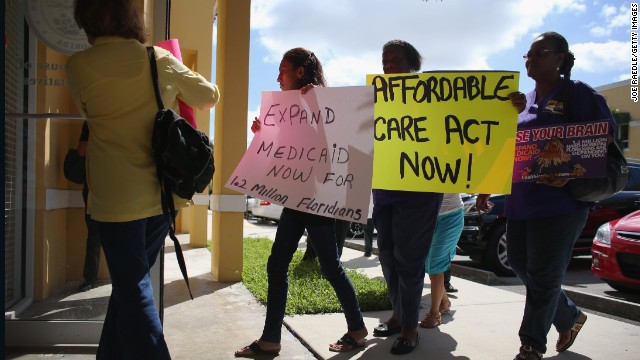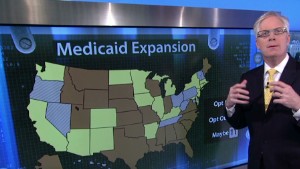- Back to Home »
- Obamacare obstruction hurts hospitals

- GOP states blocked expansion of Medicaid, and public hospitals are closing
- Sally Kohn: Medicaid expansion was meant to provide funding for these hospitals
- Kohn: Republicans put ideology over health care; refused to delay cuts to hospitals
- Kohn: States trying to spite Obama will find they are only hurting their own people
Editor's note: Sally Kohn is a progressive activist, columnist and television commentator. Follow her on Twitter at @sallykohn.
(CNN) -- The Obamacare website is open for business. But the Charlton Memorial Hospital in Folkston, Georgia, is closed.
Because Republicans in half the states have blocked the expansion of Medicaid, funds to public hospitals with large uninsured populations have been slashed. So far, at least five public hospitals have been closed this year and 5,000 hospital employees have been laid off nationwide. The closures are expected to worsen in the coming years.
In Georgia, as many as 15 more rural hospitals may close "within months" and in Tennessee, which is putting off a decision on expanding Medicaid, almost half of the 61 rural hospitals in the state might face "major cuts or closure." This is a direct — and disastrous — consequence of Republicans' ideological opposition to Obamacare.

When the Affordable Care Act was originally passed, subsidies to hospitals with large uninsured "charity care" populations were cut, figuring that the expansion of Medicaid under the law would replace this funding. But then the Supreme Court ruled that states could decide whether to expand Medicaid or not. Half the states have said they will not extend Medicaid or are putting off deciding. These are states mostly controlled by Republican governors, state legislatures, or both.
There was really no downside to extending Medicaid to cover individuals who earn up to 133% of the federal poverty level. The federal government is covering 100% of the cost of Medicaid for the next two years and 90% afterward. Columnist Josh Barro has pointed out the bind: "(W)hen Republican state officials decline to participate, they will have to explain to both medical providers and potential Medicaid beneficiaries that they turned down free federal money just to spite the President." And yet the 25 states that have indeed refused Medicaid expansion will soon find they're not just spiting the President but also their own citizens.
The people who rely on these "essential hospitals" aren't just low-income folks. Middle-class Americans who live in rural communities will have to travel 40 or 50 miles just to reach the nearest emergency room if these hospitals close their doors.
According to Bloomberg News, Pam Renshaw crashed her four-wheeler in Folkston, Georgia, and suffered painful second- and third-degree burns on nearly half her body. But her local hospital had shut down. It took two hours for her to get to an ambulance center 20 miles away and then on to a hospital in Florida where she could get treatment.
 Obamacare spikes Medicaid enrollment
Obamacare spikes Medicaid enrollment  Perry: Medicaid broken like the Titanic
Perry: Medicaid broken like the Titanic As more of these horror stories emerge and as more hospitals close, even the most diehard Republican voters in these rural communities won't care about ideological grandstanding. They'll just want their hospitals open.
On the heels of news of rural hospitals shuttering come reports that health care costs overall are falling and that the cost of Obamacare is expected to be billions of dollars less than expected. Of course, some of the decline in health care cost is certainly the result of a still-sluggish economy. Yet does anyone doubt that if health care costs had risen in the same period to even a fraction of a degree, Republicans would be screaming from the rooftops, blaming Obamacare?
We might not be able to expect fervent anti-Obamacare ideologues to act rationally in the face of facts — but what we can expect is that their constituents will be even more vexed to see that as health care costs nationwide are falling, the hospitals on which they depend are closing.
Desperate to try to blame everything and the weather on the Affordable Care Act, Republicans have tried to pin the cuts in subsidies to hospitals on the dynamics of the law alone.
A spokesperson for Georgia's Republican Gov. Nathan Deal blamed the Affordable Care Act for cutting subsidies to the hospitals that treat the uninsured while refusing to acknowledge the governor's power to expand Medicaid at the state level and solve the entire crisis.
You heard that right: Republicans like Deal, constantly railing against the federal government and clamoring for "state's rights," are suddenly abdicating state responsibility and blaming the feds for not fixing the problem.
It's the same hypocritical dynamic at work in more than 30 states that have turned their roles in setting up health insurance exchanges over to the federal government. It seems Republicans want state authority when it comes to pushing their conservative agenda but not when it comes to providing basic health care and access to insurance for their residents.
Not that Republicans at the federal level are any more responsible. Congress refused to pass a law that would have delayed the subsidy cuts for rural hospitals until more states decide whether they're extending Medicaid.
These acts of ideological intransigence by Republicans at the federal and state levels will not hurt Obamacare. The Affordable Care Act is the law of the land, its components are broadly popular with the majority of American people and it will only become more so as it is fully implemented and most people see the quality of their care go up as their costs go down.
No, Republicans are only hurting their constituents — folks in redder parts of red states who rely on rural hospitals for emergency room treatment, oncology visits, maternity wards and other basic care. Purely for ideological reasons, Republicans are creating a health care crisis — in their own states.
Follow us on Twitter @CNNOpinion.
Join us on Facebook/CNNOpinion.
The opinions expressed in this commentary are solely those of Sally Kohn.







